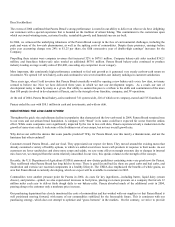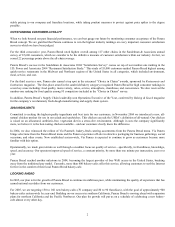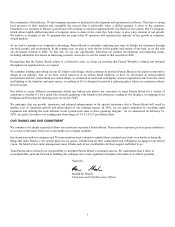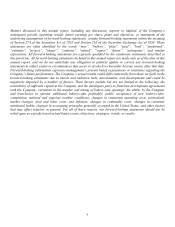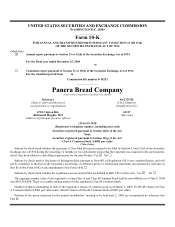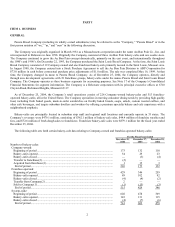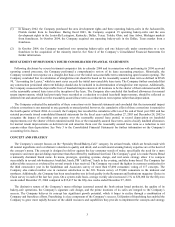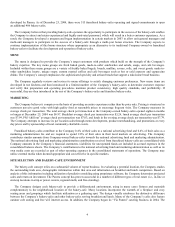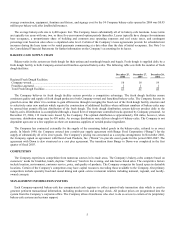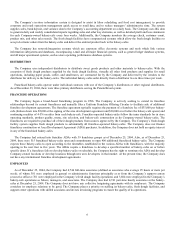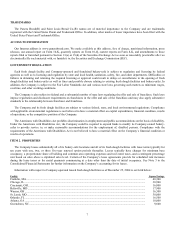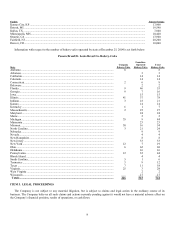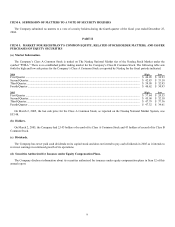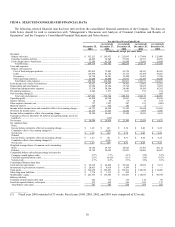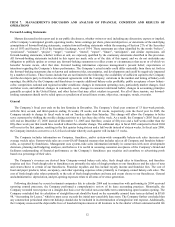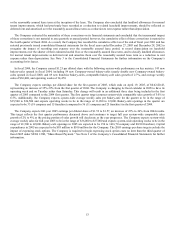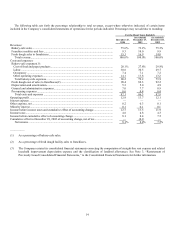Panera Bread 2004 Annual Report Download - page 12
Download and view the complete annual report
Please find page 12 of the 2004 Panera Bread annual report below. You can navigate through the pages in the report by either clicking on the pages listed below, or by using the keyword search tool below to find specific information within the annual report.The Company’s in-store information system is designed to assist in labor scheduling and food cost management, to provide
corporate and retail operations management quick access to retail data, and to reduce managers’ administrative time. The system
supplies sales, bank deposit, and variance data to the Company’s accounting department on a daily basis. The Company uses this data
to generate daily and weekly consolidated reports regarding sales and other key elements, as well as detailed profit and loss statements
for each Company-owned bakery-cafe every four weeks. Additionally, the Company monitors the average check, customer count,
product mix, and other sales trends. The fresh dough facilities have computerized systems which allow the fresh dough facilities to
accept electronic orders from the bakery-cafes and deliver the ordered product back to the bakery-cafes.
The Company has network/integration systems which are corporate office electronic systems and tools which link various
information subsystems and databases, encompassing e-mail and all major financial systems, such as general ledger database systems,
and all major operational systems, such as store operating performance database systems.
DISTRIBUTION
The Company uses independent distributors to distribute sweet goods products and other materials to bakery-cafes. With the
exception of fresh dough products supplied by the fresh dough facilities, virtually all other food products and supplies for retail
operations, including paper goods, coffee, and smallwares, are contracted for by the Company and delivered by the vendors to the
distributor for delivery to the bakery-cafes. The individual bakery-cafes order directly from a distributor two to three times per week.
Franchised bakery-cafes operate under individual contracts with one of the Company’s distributors or other regional distributors.
As of December 25, 2004, there were three primary distributors serving the Panera Bread system.
FRANCHISE OPERATIONS
The Company began a broad-based franchising program in 1996. The Company is actively seeking to extend its franchise
relationships beyond its current franchisees and annually files a Uniform Franchise Offering Circular to facilitate sale of additional
franchise development agreements. The franchise agreement typically requires the payment of a franchise fee of $35,000 per bakery-
cafe (broken down into $5,000 at the signing of the area development agreement and $30,000 at or before the bakery-cafe opens) and
continuing royalties of 4-5% on sales from each bakery-cafe. Franchise-operated bakery-cafes follow the same standards for in store
operating standards, product quality, menu, site selection, and bakery-cafe construction as do Company-owned bakery-cafes. The
franchisees are required to purchase all of their dough products from sources approved by the Company. The Company’s fresh dough
facility system supplies fresh dough products to substantially all franchise-operated bakery-cafes. The Company does not finance
franchisee construction or Area Development Agreement (ADA) purchases. In addition, the Company does not hold an equity interest
in any of the franchised bakery-cafes.
The Company had entered into franchise ADAs with 39 franchisee groups as of December 25, 2004. Also, as of December 25,
2004, there were 515 franchised bakery-cafes open and commitments to open 406 additional franchised bakery-cafes. The Company
expects these bakery-cafes to open according to the timetables established in the various ADAs with franchisees, with the majority
opening in the next four to five years. The ADAs require a franchisee to develop a specified number of bakery-cafes on or before
specific dates. If a franchisee fails to develop bakery-cafes on schedule, the Company has the right to terminate the ADA and develop
Company-owned locations or develop locations through new area developers in that market. At the present time, the Company does
not have any international franchise development agreements.
EMPLOYEES
As of December 25, 2004, the Company had 4,746 full-time associates (defined as associates who average 25 hours or more per
week), of whom 381 were employed in general or administrative functions principally at or from the Company’s support centers
(executive offices); 761 were employed in the Company’s fresh dough facility operations; and 3,604 were employed in the Company’s
bakery-cafe operations as bakers, managers, and associates. The Company also had 4,741 part-time hourly associates at the bakery-
cafes at December 25, 2004. The Company does not have any collective bargaining agreements with its employees. The Company
considers its employee relations to be good. The Company places a priority on staffing its bakery-cafes, fresh dough facilities, and
support center operations with skilled associates and invests in training programs to ensure the quality of its operations.
6



